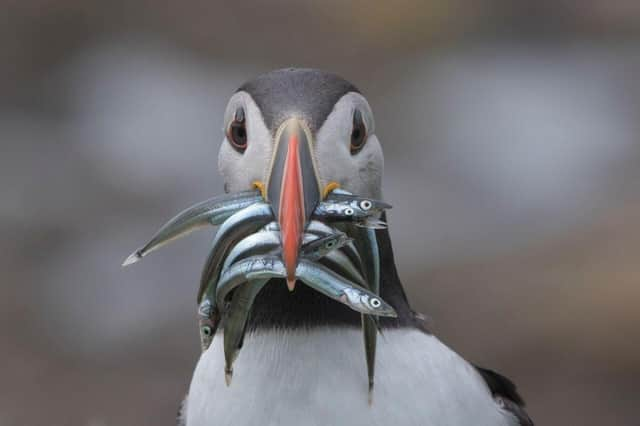RSPB Bempton Cliffs near Bridlington are once again welcoming back their famous puffin residents


Following the much-celebrated announcement by DEFRA to stop sandeel fishing in UK waters from April 1, conservationists have been waiting with excitement to see these iconic birds returning to the popular site.
Puffins gather on average around 10 sandeels in their beaks from a single foraging trip. However, today it is not often they will come back carrying so many.
Advertisement
Hide AdAdvertisement
Hide AdNow there is new optimism that puffins will once again be returning to their chicks with many more fish packed into their brightly coloured beaks after the ban.
Whilst much loved by the visiting public, many people may not know that the puffin is on the red list of conservation concern, which means it is one of our most rare and threatened seabirds.
The most recent seabird census, Seabirds Count, published in November 2023, suggests over the last 20 years that around one in four Puffins have been lost from across the UK since 2000.
Part of the reason for this is thought to be the decline in populations of sandeels – a vital food source for some of the UK’s most vulnerable seabirds, such as the iconic puffin and kittiwakes, also a red listed bird, and marine mammals.
Advertisement
Hide AdAdvertisement
Hide AdBempton’s internationally important seabird population means it has special protection. It is both a Site of Special Scientific Interest and its European importance is recognised in its designation as a Special Protection Area.
Dave O’Hara, senior site manager at RSPB Bempton Cliffs, said: “RSPB Bempton Cliffs is home to one of the UK's top wildlife spectacles.
"But these populations of seabirds are at the forefront of the climate emergency, and they are in significant decline. Puffins’ resilience is being pushed to the limit, which is why we can breathe a sigh of relief that industrial sandeel fishing in UK waters has now been ended.
“This lifeline will help to secure vital food sources for these amazing birds. Whilst many other factors continue to affect our seabird populations, including the impacts of climate change, and bycatch from fishing, we have renewed hope that sandeels will increase in numbers, and help to save our beloved puffins.
“Healthier sandeel populations mean fatter healthier chicks, which is brilliant news, and we absolutely cannot take the Puffins’ future for granted.”